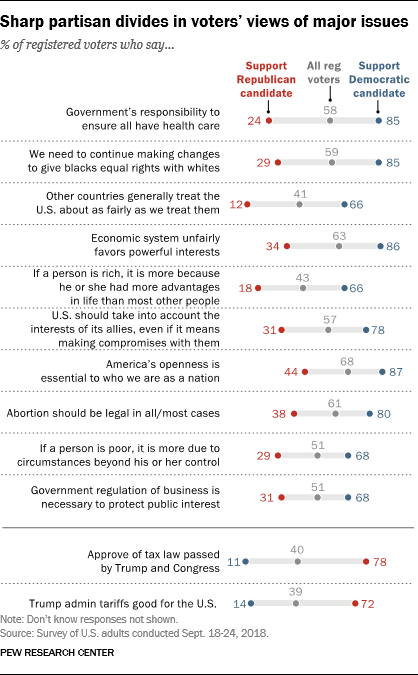 Supporters of Republican and Democratic candidates in the upcoming congressional election are deeply divided over the government’s role in ensuring health care, the fairness of the nation’s economic system and views of racial equality in the United States.
Supporters of Republican and Democratic candidates in the upcoming congressional election are deeply divided over the government’s role in ensuring health care, the fairness of the nation’s economic system and views of racial equality in the United States.
And these disagreements extend to how the U.S. should approach allies and whether or not other countries “often take advantage of the United States.”
The latest national survey by Pew Research Center, conducted Sept. 18-24 among 1,754 adults, including 1,439 registered voters, finds wide differences in the views of Republican and Democratic voters across 13 different issues and policy areas, though the size of the partisan gaps vary.
An overwhelming majority of registered voters who support Democratic candidates for Congress this November (85%) say that it is the responsibility of the federal government to make sure all Americans have health care coverage. In contrast, only a quarter of Republican voters (24%) say this is the government’s responsibility, while nearly three times as many (73%) say it is not. (For more on Americans’ views of the government’s role in providing health care, see “Most continue to say health care coverage is government’s responsibility”.)
The partisan gaps on many of these values and issues are in line with those seen in previous Pew Research Center reports, including in last year’s major report on trends in the public’s political values. That study found that the partisan gaps across a number of political values – especially on race and immigration – have widened over the past decade. In the new survey, 85% of Democratic voters say the country needs to continue to make changes to give blacks equal rights with whites, compared with 29% of Republican voters.
There also are significant gaps on views of whether abortion should be legal, the factors that make people rich and poor and the fairness of the U.S. economic system.
Two specific Trump-era policies – increased tariffs between the U.S. and its trading partners, and the 2017 tax bill – are viewed much more positively by GOP voters than by Democratic voters. Overall views of the tax law remain largely unchanged from early this year: In the new survey, 78% of voters who support the GOP candidate in their district approve of the tax law, compared with just 11% of Democrats.
And the partisan differences are about as wide in views of the Trump administration’s decision to increase tariffs on imported goods from a number of countries. Nearly three-quarters of GOP voters (72%) say increased tariffs will be good for the United States, about five times the share of Democratic voters who support higher tariffs (14%).
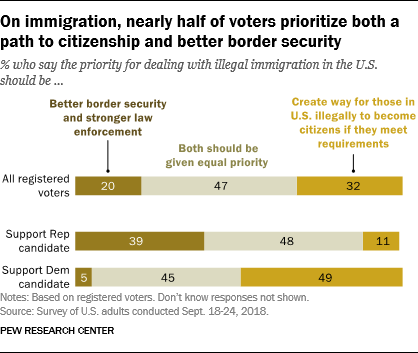 Looking at voters’ priorities for immigration policy, there is some common ground among partisans. When asked whether the policy priority should be “creating a way for immigrants already here illegally to become citizens if they meet certain requirements,” or “better border security and stronger enforcement of our immigration laws” – or whether both should be given equal priority – nearly half of Republican voters (48%) and about as many Democratic voters (45%) say both should be given equal priority.
Looking at voters’ priorities for immigration policy, there is some common ground among partisans. When asked whether the policy priority should be “creating a way for immigrants already here illegally to become citizens if they meet certain requirements,” or “better border security and stronger enforcement of our immigration laws” – or whether both should be given equal priority – nearly half of Republican voters (48%) and about as many Democratic voters (45%) say both should be given equal priority.
Still, far more Democratic voters (49%) than Republican voters (11%) say the priority should be on creating a way for those in the U.S. illegally to become citizens if they meet certain conditions. By contrast, far more Republican voters (39%) than Democratic voters (5%) say the focus should be on better border security and enforcement.
(For more on how voters view the importance of immigration, health care, taxes, trade and other issues, see “Voter Enthusiasm at Record High in Nationalized Midterm Environment.”)
Shifting priorities for dealing with illegal immigration
Since 2016, the share of adults in the general public who say border security should take priority over creating a way for those in the country illegally to become citizens has decreased. Two years ago, about a quarter (24%) said stronger law enforcement should be the priority for dealing with illegal immigration. Today, about two-in-ten (19%) say this.
During that same period, the share who prioritize creating a pathway for illegal immigrants to gain citizenship has increased modestly – from 29% in 2016 to 33%.
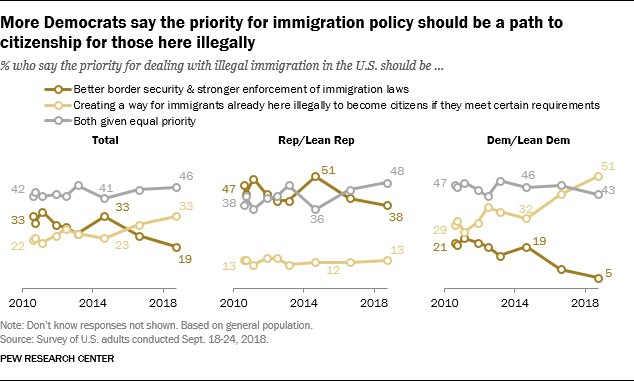
A plurality (46%) continue to say that both of these should be given equal priority.
Today, significantly more Republicans say both border security and legal pathway should be given equal priority (48%) than say the priority should be border security (38%), a shift from recent years.
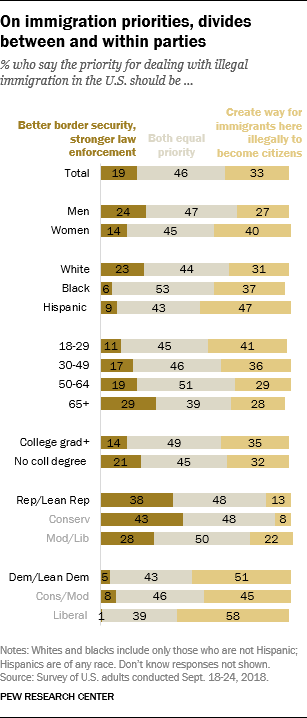 About half of Democrats and Democratic leaners (51%) now say creating a way for immigrants who are currently here illegally to become citizens should be prioritized – the largest share saying this since the question was first asked in August 2010; 43% say border security and a pathway to citizenship should be given equal priority. Just 5% say border security should take the higher priority.
About half of Democrats and Democratic leaners (51%) now say creating a way for immigrants who are currently here illegally to become citizens should be prioritized – the largest share saying this since the question was first asked in August 2010; 43% say border security and a pathway to citizenship should be given equal priority. Just 5% say border security should take the higher priority.
There are large demographic differences within the general public on priorities in dealing with illegal immigration.
Women are much more likely to prioritize a legal pathway to citizenship than men (40% to 27%).
Though a plurality of whites say both should be equally prioritized, whites (23%) are far more likely than blacks (6%) and Hispanics (9%) to say better border security should take priority.
About half of Hispanics (47%) say a pathway for legal citizenship should be the priority, while 43% say both should be equally prioritized. Among blacks, 53% say both should be equal priorities, while 37% say the priority should be creating a way for those in the country illegally to become citizens.
Republicans are more likely than Democrats to prioritize stronger law enforcement, while Democrats are more likely to prioritize a path to citizenship for those currently in the U.S. illegally.
Americans’ views of relationships with other nations
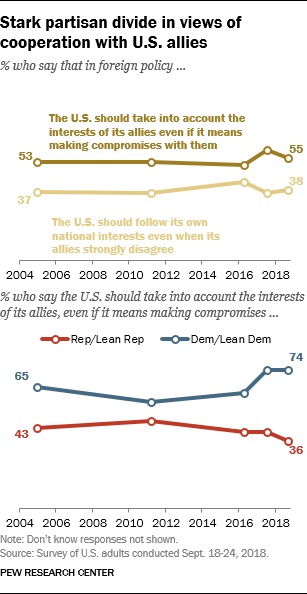 A majority of Americans (55%) continue to say that the U.S. should take into account the interests of its allies in foreign policy, even if it means making compromises with them. Fewer say the U.S. should follow its own national interests, even when its allies strongly disagree (38%).
A majority of Americans (55%) continue to say that the U.S. should take into account the interests of its allies in foreign policy, even if it means making compromises with them. Fewer say the U.S. should follow its own national interests, even when its allies strongly disagree (38%).
Since 2017, the public has become slightly less likely to say compromising with allies is preferable (59% then, 55% now). This downtick is also more in line with opinions measured in years prior to 2017.
As was true a year ago, Republican and Democratic views differ. Currently, a 38-percentage-point gap separates partisans on whether the U.S. should take into account the interests of allies – one of the largest partisan gaps measured in the past 15 years.
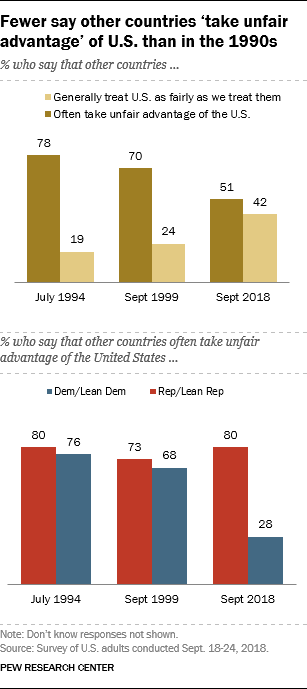 On balance, more adults say that other countries often take unfair advantage of the U.S. (51%) than say that other countries treat the U.S. about as fairly as we treat them (42%). In the 1990s, Americans were much more likely to view other countries’ treatment of the U.S. as unfair than they are today.
On balance, more adults say that other countries often take unfair advantage of the U.S. (51%) than say that other countries treat the U.S. about as fairly as we treat them (42%). In the 1990s, Americans were much more likely to view other countries’ treatment of the U.S. as unfair than they are today.
When the question was last asked nearly two decades ago, 70% said that other countries take advantage of the U.S. while just 24% said that other countries treat the U.S. with mutual fairness.
These changes are largely attributable to a shift in views among Democrats and Democratic leaners. In 1999, about two-thirds of Democrats (68%) said other countries often take unfair advantage of the U.S.; just 28% say that today. By comparison, 80% of Republicans now say that other countries take unfair advantage (up from 73% in September 1999). As a result, today there is a wide divide between Republicans and Democrats in these views, when there had been little partisan difference in the 1990s.
Among both parties, there are ideological divisions in these views. Conservative Republicans are more likely than moderate and liberal Republicans to say there is unfair treatment (85% to 67%, respectively). Liberal Democrats are more likely than conservative or moderate Democrats to say other countries treat the U.S. fairly (75% vs. 57%).
Opinions on tariffs, tax bill little changed
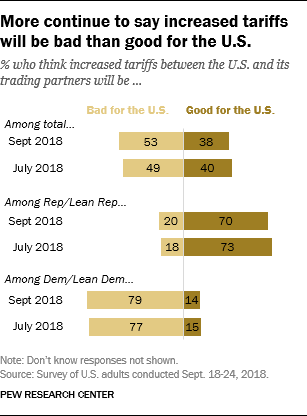 Overall, the public continues to say that increased tariffs between the U.S. and its trading partners – first imposed by the Trump administration earlier this year – will be bad for the country.
Overall, the public continues to say that increased tariffs between the U.S. and its trading partners – first imposed by the Trump administration earlier this year – will be bad for the country.
In July, roughly half of the public said they thought increased tariffs would be bad for the U.S. Today, a similar share also says this (53%).
Partisans continue to hold opposing views on this policy; 70% of Republicans say they think tariffs will be good for the U.S. Conversely, nearly eight-in-ten Democrats (79%) say they will be bad for the U.S.
Nine months after passage of the Tax Cuts and Jobs Act, views of the sweeping tax law are little changed. More say they disapprove (46%) rather than approve (36%) of the law; about two-in-ten adults (18%) do not offer an opinion either way.
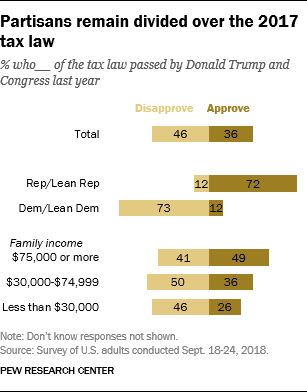 Americans with family incomes of $75,000 or more continue to offer more positive views of the law than those with lower incomes. Among Americans with annual family incomes of less than $75,000, the balance of opinion is negative (48% disapprove, 31% approve), while views of those with higher incomes are more divided (49% approve, 41% disapprove).
Americans with family incomes of $75,000 or more continue to offer more positive views of the law than those with lower incomes. Among Americans with annual family incomes of less than $75,000, the balance of opinion is negative (48% disapprove, 31% approve), while views of those with higher incomes are more divided (49% approve, 41% disapprove).
Partisan views of the bill are also similar to those measured just after its passage: 72% of Republicans and Republican-leaning independents say they approve of the tax legislation, compared with just 12% of Democrats and Democratic leaners.
Republicans are somewhat divided along ideological lines. A 79% majority of conservative Republicans say they approve of the bill, while a narrower majority (61%) of moderate or liberal Republicans say the same. Among Democrats, there are no significant differences in these views by ideology.


